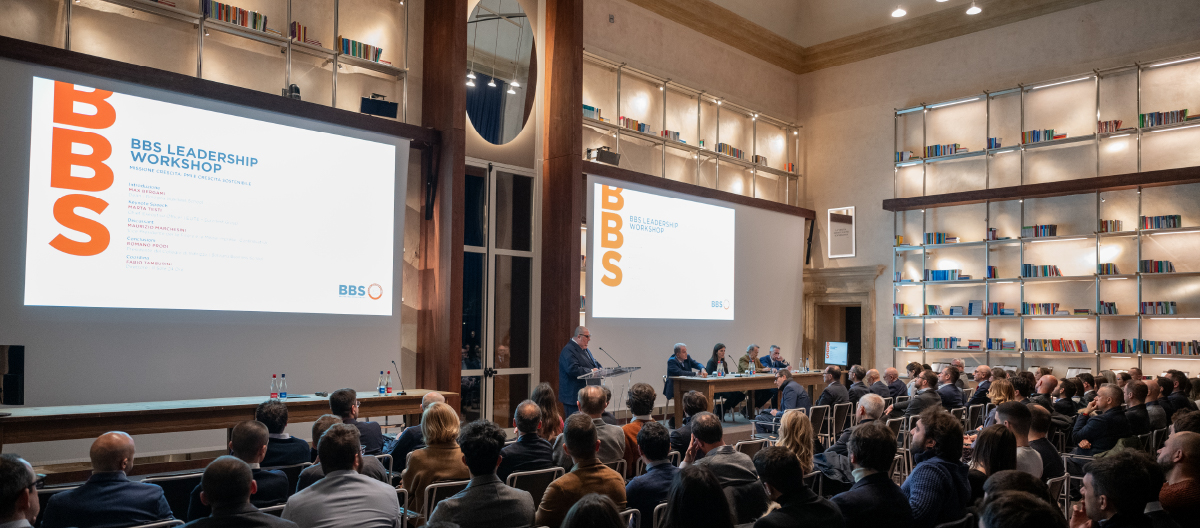
Mission growth: sustainable growth for small and medium-size Companies – A Strategic Dialogue
30 January 2024On Friday, January 26th, at the historic headquarters of the Bologna Business School, Villa Guastavillani, the first BBS Leadership Workshop 2024 took place.
The event, titled “Mission Growth: SMEs and Sustainable Growth,” featured prominent figures from the economic and entrepreneurial world and facilitated a cross-examination of different perspectives on the sustainable development of small and medium-sized enterprises, the true backbone of the Italian economic fabric.
Thanks to the large turnout, which exceeded the confines of the Aula Magna hosting the event, it was also possible to delve deeper into certain aspects through questions from the BBS Community. Among the participants – in addition to Marta Testi, CEO of Elite, a company of the Euronext Group – were Maurizio Marchesini, Vice President for Supply Chains and Medium Enterprises in Confindustria, and Fabio Tamburini, Director of Il Sole 24 Ore, acting as coordinator. A special guest was the BBS Board of Directors President, Romano Prodi, who contributed his vast experience for further insight.
The event was opened by the Dean of BBS, Max Bergami, who warmly welcomed speakers and participants, then highlighted the importance of SMEs in the national and regional economic landscape and emphasized the need to become aware of the growth strategies necessary to support them.
Dean Bergami immediately called upon Fabio Tamburini, whose speech brought optimism, even in a challenging global context. “We live in a somewhat gloomy era,” Tamburini admitted, “but we must recover the ability to be optimistic.” And while large enterprises in Italy belong to the past, there is a “medium-sized enterprise that has grown and strengthened” and competes rightfully, surpassing German and French realities.
Marta Testi then took the floor, sharing her experience and vision. A central aspect of her speech was the analysis of the five fundamental drivers for the growth of SMEs: strategy, people, innovation, markets, and finance. She explained how growth must be driven by a clear and shared strategy within the company. “To grow, a company must have a strategy,” she stated, emphasizing that this should not just be a formal document but an attitude and a continuous ability to adapt and pursue company objectives. Testi then discussed the importance of people in the growth process, highlighting that every strategy, however brilliant, requires capable and motivated people to implement it. She also discussed the importance of innovation as a technological process and a mindset and approach within the company.
Additionally, she addressed the issue of markets, underlining the need for SMEs to identify and reach the right markets for their products or services. She then spoke about finance, describing it as a means, not an end, to accelerate growth and innovation. The CEO of Elite concluded her speech by emphasizing the importance of relationships and sustainability. She highlighted that no development can exist without solid relationships and that sustainability must be understood broadly, including economic, social, and environmental aspects.
Maurizio Marchesini finally offered a pragmatic and direct perspective, emphasizing the unique context in which Italian SMEs operate. “In the world, we are the ones who occupy the small or large niches,” he explained, highlighting how Italian SMEs excel in creating high-quality products and services, often custom-made and on request, in sectors that go well beyond the traditional three Fs (furniture, food, fashion). He then addressed the issue of the size of companies, a crucial theme for competitiveness in the global market. “Our companies are too small,” observed Marchesini, “we have too few supply chain leaders.” However, he emphasized that the entrepreneur’s goal is not simply to grow for the sake of growth but to make the company safer and more stable. Regarding innovation in SMEs, Marchesini debunked the myth that innovation is the exclusive prerogative of large companies or requires significant investments. He brought the example of his company, which is committed to developing artificial intelligence with internal resources and by collaborating with startups, demonstrating how innovation can be agile and accessible even for smaller realities. Finally, he touched on the finance theme, considering it an indispensable “raw material” but warning about the risk of finance dominating the industry. “Finance is important,” he said, “but woe to us if the industry is dominated by finance.”
The event thus offered a complex and articulated overview of the challenges and opportunities that Italian SMEs face in a rapidly evolving global economic context. The discussion highlighted the importance of a balanced and multifaceted approach to growth, integrating economic, social, and environmental considerations outlining a sustainable development path for Italian companies.
